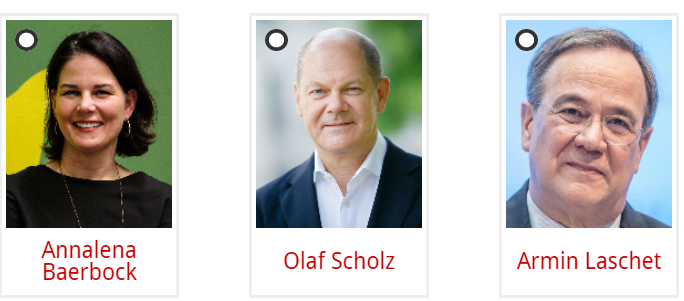Det tyske valg viser en klar tendens til, at tysk politik rykker mod midten og lidt til venstre. Den helt store vinder bliver ifølge meningsmålingerne socialdemokratiet SPD, mens de borgerlige partier CDU/CSU går dramatisk tilbage. Men venstrefløjen med partiet Die Linke styrkes dog ikke, men går snarere lidt tilbage, mens det liberale parti FDP styrkes kraftigt. De Grønne er sakket lidt tilbage, men har stadig en stabil stærk position. En tre-parti-regering er eneste mulighed. Der kan regeres uden om CDU/CSU, men SPD vil sandsynligvis indgå i en regering i kraft af fremgangen og den meget stærke opbakning, som SPD-kanslerkandidaten Olaf Scholz har i meningsmålingerne. Der kan dannes en decideret venstreorienteret regering, men det er ikke sandsynligt. Derfor er det snarere midten i tysk politik, der styrkes.
Uddrag fra ABN Amro:
Germany’s shift to the left
Euro politics: Centre-left SPD is leading the polls; could dominate the next coalition – On Sunday 26 September, the 2021 federal election will be held in Germany. Recent polls have persistently put the centre-left SPD in the lead, although the gap with the conservative CDU/CSU (also called the Union) and the Greens is rather small.
Moreover, as was shown during the 2017 election, the final distribution of the seats in parliament (Bundestag) can still differ from the final election polls with a margin of around two to four percent for each party.
Having said that, if the SPD were indeed to win the election, its leader Olaf Scholz would become the next Chancellor and the SPD would also take the lead in the formation of the next coalition, which will have different political priorities than the previous coalition. For instance, Germany’s traditional fiscal austerity might shift towards a more expansionary policy stance with less stringent debt restrictions, which would give the government more fiscal leeway.
In line with a broader trend of changes in European politics, Germany’s political landscape has become more fragmented in recent years. This has resulted in a move away from the traditional parties around the centre of the political spectrum, towards Green parties and extreme left and right.
Today, the Greens are almost guaranteed a place in the next ruling coalition in Germany (see below). Furthermore, this fragmentation implies that multi-party coalitions of more than two parties or minority governments are now quite common in Europe. In Germany, the recent polls suggest that for the first time in many decades, the next German government will consist of three instead of only two parties.
Based on the current polls and assuming that the SPD will become the largest party, a number of options for a majority coalition are possible.
We have looked at the election manifesto’s of the three largest parties (SPD, Union and Greens). These indicate that the SPD’s preferred coalition partner would be the Greens. Both parties have many points in common in their political programmes, particularly with regards to labour and social affairs (for instance each party wants to raise the minimum wage). Although the Greens have the most ambitious climate agenda of the three biggest parties, its ambitions are closer to those of SPD than those of the Union.
Also, both SPD and the Greens are less focussed on returning to a balanced government budget than the Union, so fiscal policy can be more supportive to growth than in a coalition with the Union. Finally, we think a renewed alliance between the Union and SPD will be difficult considering that the SPD would be dominant this time around, and that there have already been serious political tensions between the parties in recent years.
In order to get a majority of the seats in parliament, a union between SPD and the Greens will have to be joined either by the centre-right liberal FDP or the left-wing Die Linke. Entering a coalition with the Die Linke will probably not be the SPD’s first choice, as Olaf Scholz has stated that he considers Die Linke too radical and hard-left. However, a potential coalition with Die Linke has also not been completely ruled out by neither the SPD nor the Greens.
If the liberal FDP rejects a coalition with the SPD and the Greens (which seems very likely), a left-wing coalition will be the only option left for the SPD. This type of coalition (SPD, Greens, Die Linke) has already governed Germany’s state Berlin since 2016.













